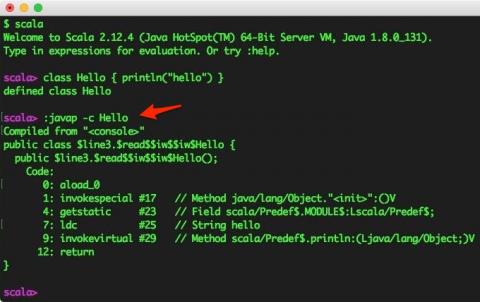By Alvin Alexander. Last updated: July 20, 2020
As shown in the image, I was just reminded that you can run javap inside the Scala REPL. The REPL help command shows some other things you can do:
scala> :help All commands can be abbreviated, e.g., :he instead of :help. :edit <id>|<line> edit history :help [command] print this summary or command-specific help :history [num] show the history (optional num is commands to show) :h? <string> search the history :imports [name name ...] show import history, identifying sources of names :implicits [-v] show the implicits in scope :javap <path|class> disassemble a file or class name :line <id>|<line> place line(s) at the end of history :load <path> interpret lines in a file :paste [-raw] [path] enter paste mode or paste a file :power enable power user mode :quit exit the interpreter :replay [options] reset the repl and replay all previous commands :require <path> add a jar to the classpath :reset [options] reset the repl to its initial state, forgetting all session entries :save <path> save replayable session to a file :sh <command line> run a shell command (result is implicitly => List[String]) :settings <options> update compiler options, if possible; see reset :silent disable/enable automatic printing of results :type [-v] <expr> display the type of an expression without evaluating it :kind [-v] <type> display the kind of a type. see also :help kind :warnings show the suppressed warnings from the most recent line which had any
More Scala/javap examples
Here are a couple more javap examples in the Scala REPL that help to show what details are available:
scala> class Person (var name: String, var age: Int)
defined class Person
scala> :javap -public Person
Compiled from "<console>"
public class $line3.$read$$iw$$iw$Person {
public java.lang.String name();
public void name_$eq(java.lang.String);
public int age();
public void age_$eq(int);
public $line3.$read$$iw$$iw$Person(java.lang.String, int);
}
scala> :javap -private Person
Compiled from "<console>"
public class $line3.$read$$iw$$iw$Person {
private java.lang.String name;
private int age;
public java.lang.String name();
public void name_$eq(java.lang.String);
public int age();
public void age_$eq(int);
public $line3.$read$$iw$$iw$Person(java.lang.String, int);
}
javap help
Finally, here’s the output from the javap -help command that helps to explain that output:
> javap -help
Usage: javap <options> <classes>
where possible options include:
-help --help -? Print this usage message
-version Version information
-v -verbose Print additional information
-l Print line number and local variable tables
-public Show only public classes and members
-protected Show protected/public classes and members
-package Show package/protected/public classes
and members (default)
-p -private Show all classes and members
-c Disassemble the code
-s Print internal type signatures
-sysinfo Show system info (path, size, date, MD5 hash)
of class being processed
-constants Show final constants
-classpath <path> Specify where to find user class files
-cp <path> Specify where to find user class files
-bootclasspath <path> Override location of bootstrap class files
If you ever want to use javap inside the Scala REPL, I hope this information is helpful.
| this post is sponsored by my books: | |||

#1 New Release |

FP Best Seller |

Learn Scala 3 |

Learn FP Fast |
